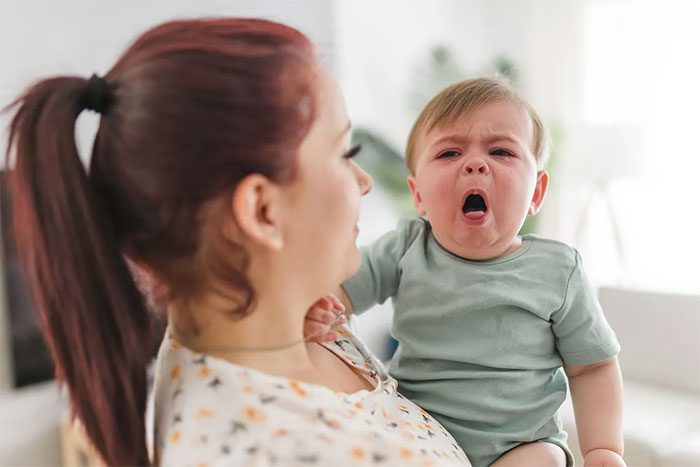Wheezing can occur at any age, but it is particularly concerning when it happens in infants. Depending on the cause, wheezing can often be treated at home with hydration, rest, and other home remedies. Medications such as inhalers may be necessary in some cases to open the airways.
1. What Causes Wheezing?
Wheezing can be caused by several factors, including:
- Upper respiratory infections
- Bronchitis
- Pneumonia
- Asthma
- Gastroesophageal reflux
- Respiratory Syncytial Virus (RSV)
- Pneumonia
- Heart failure.
Additionally, environmental allergens can also trigger wheezing symptoms, such as pollen, cigarette smoke, perfumes, vehicle exhaust, air pollution, insects, mold, pet dander, dust mites, and certain foods like peanuts and egg products.

Wheezing can have many causes and occurs at various ages. (Image: Internet).
2. Home Remedies for Wheezing
Treatment for wheezing depends on the cause, severity of the condition, and symptoms, and can often be managed at home. Here are some home remedies for wheezing that you can consider. Note that if symptoms do not improve and worsen, you should see a doctor as soon as possible. Additionally, do not self-prescribe medications without a physician’s guidance.
2.1. Honey
Taking 1.5 teaspoons of honey before bedtime can soothe coughing in children over 1 year old. Honey can cause botulism in infants under 1 year old. Keep in mind, honey is a short-term remedy as using it nightly for several days can lead to tooth decay.
2.2. Water
Increasing fluid intake with warm tea and honey can soothe the throat lining and relieve discomfort. Staying hydrated during illnesses like RSV and bronchitis helps prevent dehydration and thins mucus in the lungs.
You can divide the amount of water to make it easier to manage, especially for children with nasal congestion.
Prioritize warm liquids to reduce coughing. Infants under 6 months should only be breastfed or given formula.
2.3. Rest
Get plenty of rest and try to stay calm to make breathing easier. Sitting or lying in an upright position can help alleviate discomfort while breathing.

Resting helps the body recover faster. (Image: Internet).
2.4. Humidifiers
Humidifiers are essential devices that can help reduce nasal congestion and improve sleep quality during wheezing. You can also stay in the bathroom with the hot shower running and close the door to achieve a similar effect by thinning mucus in the nose and lungs.
2.5. Over-the-Counter Medications
Cough medicines and lozenges can help soothe coughing in both adults and children, but caution is needed with lozenges as they can pose a choking hazard for young children. Cough medications for children should be used under a doctor’s guidance, not given to children under 6 years old, and should be administered according to the dosage on the label.
Over-the-counter medications containing dextromethorphan or guaifenesin may help thin mucus or reduce cough symptoms, potentially relieving wheezing. However, there is limited evidence supporting the efficacy of over-the-counter cough medications.
2.6. Managing Asthma
If you have asthma, plan for managing and controlling symptoms for exacerbations or chronic conditions. In other words, having a management plan helps ensure that you and your caregivers know how to control asthma symptoms and respond to asthma attacks.
2.7. Recognizing Severe Wheezing
For bronchitis, see a doctor if the cough does not improve after 2 weeks or if it becomes more severe and frequent, as this may be a sign of another developing health condition, such as pneumonia.
Medical care is especially crucial when wheezing is accompanied by other symptoms like fever, blood in mucus, or difficulty breathing and chest tightness.

Pay attention to worsening wheezing symptoms. (Image: Internet).
For individuals with asthma, asthma attacks can worsen rapidly within hours or days, so be attentive to the following signs:
- Worsening symptoms such as coughing, wheezing, shortness of breath, or chest tightness
- Feeling too short of breath to talk, eat, or sleep
- Increased breathing rate and feeling of breathlessness
- Pain relief medications are ineffective
- Abdominal or chest pain, especially in children
- Rapid heartbeat
- Excessive sleepiness, exhaustion, confusion, or dizziness
- Blue or purple lips or fingers
- Fainting.
2.8. Prescription Medications
Depending on the cause, certain prescription medications may be prescribed for wheezing symptoms, including:
- Antibiotics for bacterial infections or if you are at high risk for complications like pneumonia
- Bronchodilators such as emergency inhalers, preventive inhalers, combination inhalers, Theophylline, leukotriene receptor antagonists (LTRAs), etc.
- Oral steroids when other treatments are ineffective in controlling asthma symptoms
- Prescription cough medications containing benzonatate when over-the-counter cough remedies are ineffective.
Note that you should not self-prescribe medications without a doctor’s guidance, as improper use or misuse can have significant negative impacts on health.
2.9. Managing Chronic Wheezing
Chronic wheezing due to chronic bronchitis is an incurable condition but can be managed by quitting smoking; using inhalers to open airways and reduce inflammation; oxygen therapy, mucus-thinning medications to make coughing easier, and pulmonary rehabilitation techniques to prevent worsening symptoms.
For chronic coughs where other treatments are ineffective, doctors may prescribe opioids or nerve inhibitors for chronic pain management. These medications can have considerable side effects and should only be used with a doctor’s prescription.

Chronic wheezing due to chronic bronchitis is an incurable condition. (Image: Internet)
3. When to See a Doctor for Wheezing?
In general, you should seek emergency medical care if a child or adult with wheezing experiences any of the following symptoms:
- Severe difficulty breathing, retractions in the chest, difficulty breathing in a single breath, trouble speaking
- Rapid or irregular breathing
- Wheezing even without crying, with audible wheezing during inhalation
- Unusual fatigue or difficulty waking from sleep
- Signs of dehydration such as infrequent urination, fewer wet diapers, dark brown urine, crying little or no tears, dizziness, excessive sleepiness, sunken eyes, dry mouth
- High fever, especially with cough but no runny or congested nose
- Infants under 3 months with fever or prolonged cough over a few hours
- Coughing up blood
- Wheezing starts after eating foods like peanuts, egg products, or after insect stings or taking medications
- Loss of consciousness or stopped breathing
- Pale or bluish lips and face when not coughing
- Feeling choked
- Infants under 6 months with overall poor health
- Fatigue, muscle weakness…
The above lists the causes and ways to reduce wheezing at home. Uncontrolled wheezing can pose health risks. If you notice wheezing accompanied by unusual or more severe symptoms, do not be complacent; proactively seek medical evaluation for timely diagnosis and treatment to prevent long-term impacts on quality of life.



















































